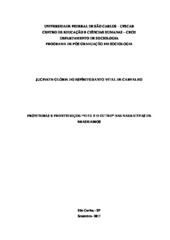| dc.contributor.author | Carvalho, Jucineth Glória do Espírito Santo Vital de | |
| dc.date.accessioned | 2019-09-13T18:36:04Z | |
| dc.date.available | 2019-09-13T18:36:04Z | |
| dc.date.issued | 2017-09-04 | |
| dc.identifier.citation | CARVALHO, Jucineth Glória do Espírito Santo Vital de. Fronteiras e fronteiriços: “o eu e o outro” nas narrativas de brasileiros. 2017. Tese (Doutorado em Sociologia) – Universidade Federal de São Carlos, São Carlos, 2017. Disponível em: https://repositorio.ufscar.br/handle/ufscar/11835. | * |
| dc.identifier.uri | https://repositorio.ufscar.br/handle/ufscar/11835 | |
| dc.description.abstract | This doctoral thesis resulted from a research process that was developed along a stretch of the Brazil-Bolivia border, in the southwest of Mato Grosso. In order to develop the study, the period 1940-2016 was delimited and an extension of the border area comprising the rural towns of Santa Clara do Monte Cristo, also known as Ponta de Aterro or Punta de La Carretera, part of the Nossa Senhora Aparecida and the community of Morrinhos, which belong to the municipality of Vila Bela da Santíssima Trindade. In the Bolivian side, the research covered the Vila de San Vicente de La Frontera and part of its surroundings. This study sought to analyze the meanings of that frontier in the perspective of the distinct frontier groups inhabitants of the region, composed of merchants, rural residents, farmers, public servants, remnants of the “Chiquitano” indigenous people and representatives of the Bolivian government. For that, investigations were made about the occupation and settlement process of the region, the social relations, constituted sociabilities and the forms of territorialization used by that society. The methodological procedures adopted were: direct observation with registration in field book; interviews and documentary research. The analysis was built using the inductive method, with a perspective and a qualitative approach, using narratives effectively, supported by oral history tools and intensive field work, with selection and direct contact with the investigated subjects. In sum, it was concluded with the study that "the self and other" in the boundary Brazil-Bolivia border are constituted from the differentiations of the subjects and not only on the nationality factor, since the limit can be constituted in a real or imaginary form, which transpires in the social relations established between frontier settlers, including: culture, language, parties and other forms of sociability. The frontier, in this sense, extrapolates the meaning of limit, of the material rigidity of the existence of a physical place. It transcends, heading for the between-places. | eng |
| dc.description.sponsorship | Fundação de Amparo à Pesquisa do Estado de Mato Grosso (FAPEMAT) | por |
| dc.language.iso | por | por |
| dc.publisher | Universidade Federal de São Carlos | por |
| dc.rights | Attribution-NonCommercial-NoDerivs 3.0 Brazil | * |
| dc.rights.uri | http://creativecommons.org/licenses/by-nc-nd/3.0/br/ | por |
| dc.subject | Fronteira | por |
| dc.subject | Fronteiriços | por |
| dc.subject | Territorialidade | por |
| dc.subject | Frontier | eng |
| dc.subject | Border crossings | eng |
| dc.subject | Territoriality | eng |
| dc.title | Fronteiras e fronteiriços: “o eu e o outro” nas narrativas de brasileiros | por |
| dc.title.alternative | Border and borders: "I and the other" in the brazilians narratives | eng |
| dc.type | Tese | por |
| dc.contributor.advisor1 | Mancuso, Maria Inês Rauter | |
| dc.contributor.advisor1Lattes | http://lattes.cnpq.br/3208435983286140 | por |
| dc.description.resumo | Esta tese de doutorado resultou de um processo de pesquisa que foi desenvolvido num trecho da fronteira Brasil-Bolívia, no sudoeste de Mato Grosso. Para a realização do estudo, delimitou-se o período de 1940-2016 e uma extensão da área de fronteira que compreende as localidades rurais de Santa Clara do Monte Cristo, conhecida também como Ponta do Aterro ou Punta de La Carretera, parte da comunidade Nossa Senhora Aparecida e da comunidade de Morrinhos, que pertencem ao município de Vila Bela da Santíssima Trindade. No lado boliviano, a pesquisa abrangeu a Vila de San Vicente de La Frontera e parte de suas cercanias.
O referido estudo buscou analisar os significados daquela fronteira na perspectiva dos distintos grupos de fronteiriços habitantes da região, compostos por: comerciantes, sitiantes, fazendeiros, servidores públicos, remanescentes do povo indígena “Chiquitano” e representantes do governo boliviano. Para tanto, foram realizadas investigações acerca do processo de ocupação e povoamento da região, as relações sociais, sociabilidades constituídas e as formas de territorialização empregadas por aquela sociedade. Os procedimentos metodológicos adotados foram: observação direta com registro em caderno de campo; entrevistas e pesquisa documental. A análise foi construída por meio do método indutivo, de cunho e abordagem qualitativa, empregando-se efetivamente as narrativas, apoiadas pelas ferramentas da história oral e o trabalho intensivo de campo, com a seleção e o contato direto com os sujeitos investigados. Em síntese, concluiu-se com o estudo que “o eu e outro” na fronteira Brasil-Bolívia delimitada se constituem a partir das diferenciações dos sujeitos e não apenas no fator nacionalidade, pois o limite pode se constituir de forma real ou imaginária, o que transparece nas relações sociais estabelecidas entre os sujeitos fronteiriços, inserindo-se: cultura, idioma, festas e outras formas de sociabilidades. A fronteira, nesse sentido, extrapola o significado de limite, da rigidez material da existência de um lugar físico. Ela transcende, encaminhando-se para os entre-lugares. | por |
| dc.publisher.initials | UFSCar | por |
| dc.publisher.program | Programa de Pós-Graduação em Sociologia - PPGS | por |
| dc.subject.cnpq | CIENCIAS HUMANAS::SOCIOLOGIA::SOCIOLOGIA RURAL | por |
| dc.publisher.address | Câmpus São Carlos | por |
| dc.contributor.authorlattes | http://lattes.cnpq.br/5718152352151392 | por |


